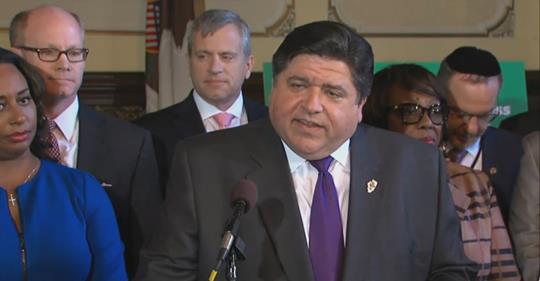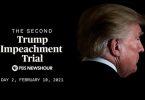Click Link to View Video:
Democratic Gov. J.B. Pritkzer waged his campaign partly on the promise of moving Illinois to a graduated income tax system, and he’s talked about it a lot since he was elected governor.
But for the first time, we now have actual language for the proposal.
The change sounds simple enough, even if it’s written in complicated legal terms.
It calls for removing a phrase from Article IX, Sec. 3 of the Illinois Constitution that reads, “a tax on or measured by income shall be at a non-graduated rate,” and replacing it with: “The General Assembly shall provide by law for the rate or rates of any tax on or measured by income imposed by the state.”
But that new language, unveiled Tuesday by sponsor Sen. Don Harmon, D-Oak Park, with the backing of Pritkzer, sets the stage for a major fight over Illinois’ constitution, and the tax policy it allows.
It’s the first legislative action making good on Pritker’s campaign promise to lift Illinois’ constitutional restriction that requires all income be taxed at a flat rate, and moving toward a system that uses a sliding scale such that the wealthy pay a higher income tax rate.
“This amendment will remove the requirement that all taxpayers pay the same rate regardless of their income. It will let us adopt a system that is more fair to the middle class,” Pritzker said at a press conference in Springfield. “It doesn’t make sense that I pay the same rate as a teacher or a first responder.”
Pritzker’s a billionaire who spent $171 million to become governor. He’s now funding a group called “Think Big Illinois” that is airing ads and otherwise promoting what it calls the “fair tax,” but because it’s a so-called “dark money” organization there’s no way to know at this point how much Pritkzer, or the group are spending (the same lack of transparency applies to “Ideas Illinois,” a business-supported group fighting what it’s dubbed Pritkzer’s “jobs tax”).
Harmon’s Senate Joint Resolution Constitutional Amendment 1 is scheduled for a vote Wednesday by a Senate committee.
Democrats, who hold supermajorities in both chambers – plus extra votes to spare – may have to pass the constitutional amendment without any Republican help.
“We should not be giving these Democrats in this building the ability to change rates – virtually a blank check to raise taxes on Illinoisians in the future. This is a $3.4 billion tax increase on Illinois citizens, Illinois businesses,” Illinois House Republican Leader Jim Durkin said.
Pritzker in early March presented a proposal he said would raise $3.4 billion by raising taxes on households with incomes at $250,000 and above, particularly on income over $1 million. While legislators are expected to vote on that plan this spring, it would not take effect unless and until the constitutional amendment opening the door to a progressive structure were adopted.
Republicans say in order to guard residents from having to pay more in the future, rates should be enshrined in the constitution too.
“If the Democrats were sincere about protecting the middle class then they should have the rates that they are proposing incorporated in the constitutional question. Otherwise they will be subject to change over the same people who have raised taxes over the last 10 years. And you just can’t trust them,” Durkin said.
But Republicans may want to be careful what they wish for; Pritkzer says locking in rates would also prevent future General Assemblies from lowering rates.
“I think that this legislature and future legislatures ought to have choices – all the choices – available to them. The future is unknown,” he said.
If three-fifths of the members of both the Senate and House approve the amendment language, the question of whether to change the constitution would be put before voters during the next statewide election, during the presidential cycle in 2020.
Follow Amanda Vinicky on Twitter: @AmandaVinicky







